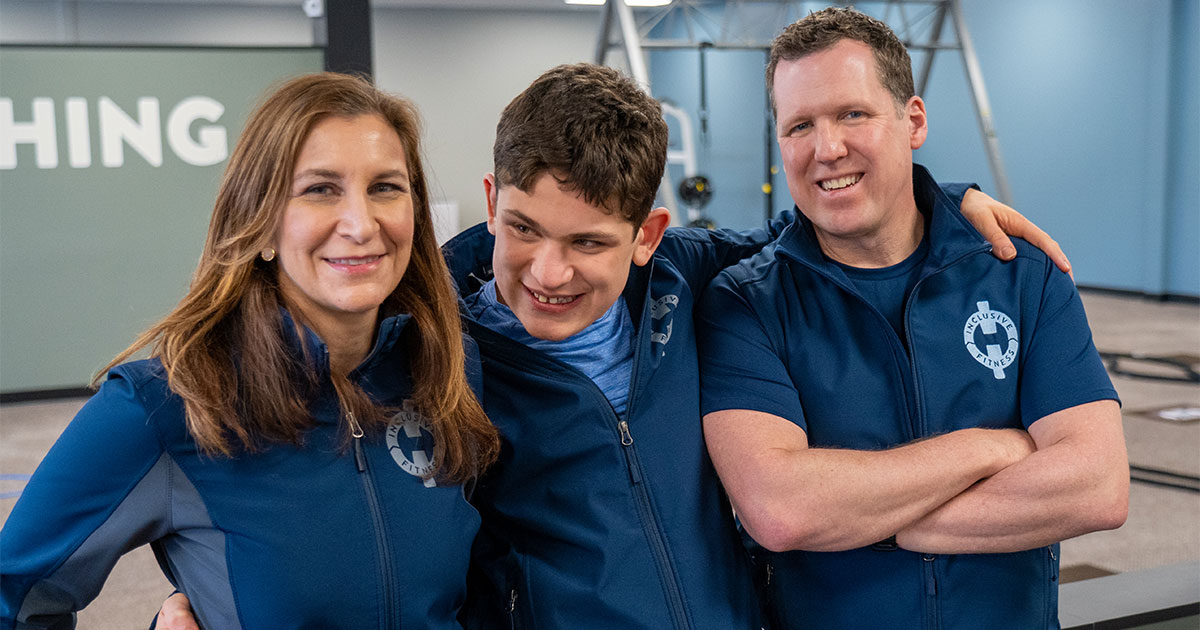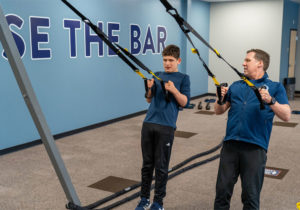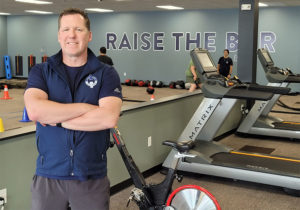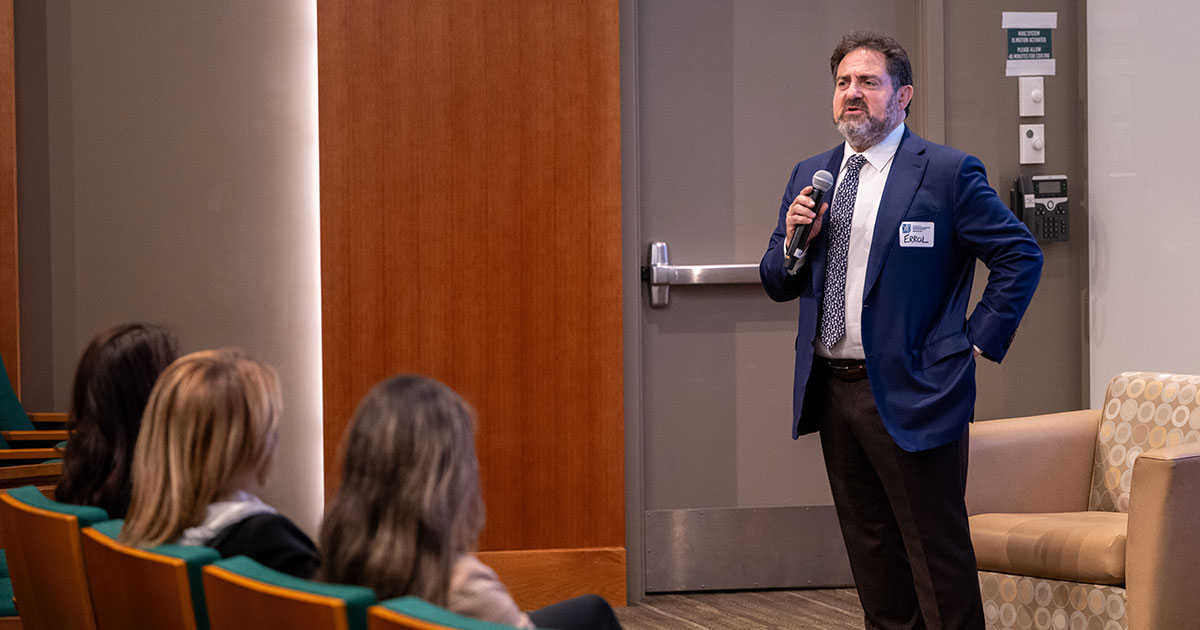A Gym That’s Inclusive of All

When their son was diagnosed with autism at the age of 3, Greg and Kristina Austin, both MBA’01, did what so many other parents do when trying to digest and understand such sudden news: They took a breath and then learned as much as they could. “You get deeply involved in that world,” Greg says, “one you never anticipated you would become a part of.”
As the years passed, one thing they noticed about Lucas—now a funny, outgoing, and imaginative teen who likes horseback riding and telling stories and who will turn 17 in September—is how much he benefits from physical exercise. Swimming and riding a bike were both challenges initially, but once Lucas had the right instructors, he learned how to do both, and those activities are now a regular part of his life.
“We noticed when we got Lucas active, he was much more balanced,” Greg says. “When he exercises, he is more calm, more focused, more confident. He is a happier kid.”
Finding suitable, long-term programs for him, though, wasn’t easy. “I was always looking for athletic programs for Lucas,” Kristina says, “but I saw a gap in the market.” Despite the fact that individuals who are neurodivergent—an umbrella term that includes autism, Down syndrome, cerebral palsy, traumatic brain injury, and other neurological disabilities—often become less and less active as they age, badly needed exercise programs tailored to them aren’t common. “There is a massive lack,” Greg says. “They need a different kind of program, a different kind of experience.”

Greg Austin MBA’01 (right) works out with his son, Lucas, at Inclusive Fitness.
That’s why the Austins decided to launch Inclusive Fitness, a gym in Boston’s West Roxbury neighborhood that is designed for the physical, adaptive, and cognitive needs of neurodiverse adolescents and adults. Such a facility is a rarity. Only about 10 gyms in the country are fully dedicated to this population, Greg says.
Greg serves as the Inclusive Fitness’s president, while Kristina offers support behind the scenes, as she continues her marketing career in the tech space. “We wanted Lucas to have more opportunities like this,” Greg says. “We wanted his friends to have more opportunities like this.”
‘Meet Them Where They Are’
Filled with kettlebells and treadmills, medicine balls and dumbbells, Inclusive Fitness looks like any other gym at first glance. But, it’s also different in crucial ways. Unlike the loud, frantic atmosphere one might experience at a typical gym, Inclusive Fitness is quiet and calm. There are no bright lights or loud music. “Our athletes can’t focus in an environment like that,” Greg says. “They need less distraction.”
They also need to feel comfortable. Some people coming to Inclusive Fitness may not feel ready to begin an exercise program, much less step inside an unfamiliar environment, so Inclusive Fitness coaches must be attentive and patient. For instance, when a regular gym-goer named Terry began at Inclusive Fitness, he wasn’t comfortable coming inside. So, Greg met him in the parking lot, where they tossed a medicine ball back and forth for five minutes before Terry had enough and would leave.
Other individuals need to work their way up to just touching the front door, or if they make it inside, simply touching a ball. When another gym-goer named Mary started at Inclusive Fitness, the focus was on having her stand inside a square outlined on the floor for three seconds, a task that was difficult for her at the time. More than a year later, she now participates in full 45-minute workouts.
“We wanted Lucas to have more opportunities like this. We wanted his friends to have more opportunities like this.”
Greg Austin MBA’01, president and co-founder of Inclusive Fitness
Figuring out the best way to motivate and teach its athletes is the hardest challenge Inclusive Fitness faces. “We need to meet them where they are,” Greg says. The gym believes that every person who walks in the door, despite whatever their neurodivergence may be, can exercise and be healthy. “We should never be the ones who say someone can or cannot do something,” he says.
The workouts at Inclusive Fitness are much like what are found at other gyms, though exercises aren’t done simply for the sake of gaining strength or size or a certain look. Rather, the gym focuses on functional fitness training, on making participants stronger for the day-to-day activities of life, whether that is carrying groceries or going for a walk or mowing the lawn.
Participants are typically surprised by what they accomplish. So are their parents, who may have tried multiple programs in the past that didn’t work out and may be relieved they finally found something that helps their child. “I have had family members break down because they didn’t know this was possible,” Greg says.
Kristin Abendroth, the gym’s director of client experience and also a co-founder with the Austins, has witnessed the progress of participants firsthand. “We have athletes who say they have never worked out before. They have never been in a gym before,” she says. “Seeing them accomplishing things they, or their family members, didn’t think were possible is very rewarding.”
‘I Can Do Anything’
The decision to start Inclusive Fitness came out of many conversations between Greg and Kristina. “We founded the company together at the proverbial kitchen table, but also while taking walks and hikes with Lucas,” Kristina says.

Greg Austin MBA’01 hopes to expand Inclusive Fitness to more locations and hire neurodivergent individuals, a population that has difficulty finding employment, as staff.
Starting a gym felt right to the physically active couple. Greg was once a personal trainer who was involved with wilderness search and rescue, while Kristina was a tri-athlete. Before Inclusive Fitness, Greg did have a successful career at a global sales and marketing firm, where he managed a team of 60 people, but leaving it behind wasn’t a hard decision. “I needed something more meaningful, something that would leave a lasting impact,” he says.
Greg says he couldn’t have started the gym, though, without his career experiences, not to mention the couple’s Babson degrees. The Austins were a young married couple while at Babson and celebrated their first anniversary while looking at case studies in their apartment. Babson provided the couple with critical thinking and analytical skills, not to mention mentors. “A lot of people who start gyms are muscle heads. We are not. We are business people,” Greg says. “Really successful gyms are run by business people.”
After months of researching, designing the space, and raising funds, Inclusive Fitness opened its doors in October 2020 with only two members. Today, it has more than 150. Greg says that once the gym is profitable, which should be next year, he will look to open two more locations in the Boston area. Ultimately, he hopes to expand nationally, and along the way, he plans to hire neurodivergent individuals as employees. He also hopes to have the program eventually receive reimbursement from health insurance companies.
The aspirations are big, and so are the benefits to the neurodiverse community. When the physically fit Lucas completed his first triathlon, Kristina remembers the words he spoke: “I can do anything.”
Those words are now written on the wall in large letters at Inclusive Fitness.




